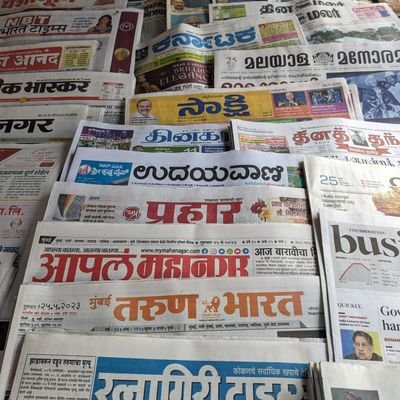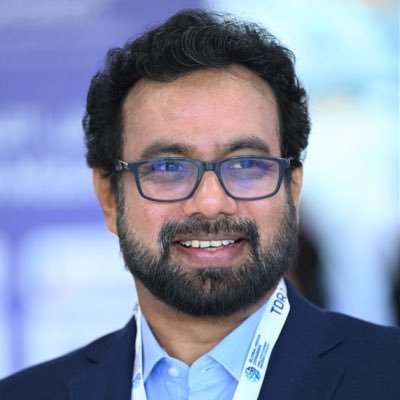
Indian Linguistics | Bhāṣāśāstra
@TianChengWen
Followers
4K
Following
219
Media
50
Statuses
2K
Observations on Indian linguistics, languages, language use, primarily from South, West India. Run by @SandalBurn. Mail @ [email protected] for work inquiries.
Seattle, WA
Joined June 2017
Since yesterday's tweet blew up – I'm a researcher & writer focusing on language histories across the Deccan & India's western coast. I've worked w/ journo publications, type designers, academic teams. Please get in touch (via sainyn@gmail.com) if you'd like to work together!
1
2
17
Hindi and Marathi speakers, do you or have you heard the word girjā(ghar) for "church" used by people in everyday speech? If so, is it mostly by rural/older speakers?
1
0
1
Indian institutions and government bodies, except for a handful, have not supported the growth of a robust resource ecosystem for Indian languages. It's disingenuous to suggest that foreign researchers have some vested interest in a field that isn't even prioritized domestically.
0
1
3
The unasked question is why does it take researchers at foreign universities (of any nationality, including Indian) to conduct much of the substantial work on Indian literary cultures. Indian academia is poorly funded and disincentivizes this work, even as we claim we value it.
1
3
9
If this is the welcome extended to scholars working to broaden our understanding of Indian languages and literary cultures from outside domestic academia, what sort of open-mindedness can we expect of scholarship? Local experts will face diff engaging with global academia too.
0
0
7
Orsini has spent decades working on Hindi literary culture and print networks, and in conceptualizing literary currents across India in different languages and eras. Our understanding of the world of Hindi (and North Indian) literary culture would be poorer without her writing.
1
1
12
Scholarship *in India* on Indian langs & literary cultures has long suffered from inwardness with many choosing to study/work outside India. Instead of trying to rectify this & make Indian academia more welcoming, we see restrictions on academic mobility. https://t.co/hPKSwmbduD
thewire.in
Francesca Orsini is perhaps the fourth foreign scholar with a valid visa to be denied entry in recent years. Indian officials claim she was blacklisted for doing research in the past on a tourist v...
9
28
81
Over the summer, I worked with the Script Encoding Initiative to think about how the typewriter prompted linguistic communities in India to re-imagine their scripts and attempt to make them "modern". I wrote about my research process: https://t.co/erIplODH0o
sei.berkeley.edu
In 1971, much of the complexity of the Malayalam script was suddenly flattened out. The impetus for this change? The development of a typewriter.
0
1
4
This is far from unprecedented, though. Kamaraj campaigned for the Congress in Bihar in the past, giving speeches entirely in Tamil, translated into Hindi for local voters. But also, somehow politicians speaking in Hindi in let's say Karnataka or West Bengal isn't odd?
1
0
3
Odd comment. First off, translators exist. Second, if the implication is that you can only speak to an audience that already understands your language, this logic would relegate cross regional/linguistic communication to *English*, rather than centering Indian languages.
What is the logic of getting the TN CM to campaign in Bihar and addressing the crowd in Tamil! Imagine Tejashwi Yadav campaigning for DMK in Tamil Nadu and speaking in Hindi at the rally 🥲🥲
1
1
7
To be clear, I'm all in favor of states granting local non-state languages greater rights, but it's worth thinking more deeply about how language planning would look. Linguists, historically, have rarely been consulted for such initiatives; they have been bureaucratic projects.
0
0
1
.. there isn't a sizeable Tulu speaking community) be able to access government services in Tulu too? I would imagine somewhere like WB or Assam (Nepali, Bengali dominant and official in certain districts but not elsewhere) would make for better models to follow.
1
0
1
This is an interesting development for #Tulu, but I wonder what form it would take. The officials mention using Andhra as a reference, where Urdu was first co-official in certain districts (before Telangana split), but now co-official at the state level. https://t.co/KwDAM8ytJ0
newindianexpress.com
MANGALURU: The Karnataka government has constituted a five-member committee to examine the criteria followed by Andhra Pradesh in declaring a second official la
1
1
5
There is a certain lineage to this claim, it didn't arise out of nowhere. Tamil linguistic nationalism in pre and post independent eras often characterized Tamil as the fount of the other Dravidian languages, seen as its descendants. Its "purity" & antiquity, taken as proof.
0
0
6
I'm just glad that the controversy sparked off by Kamal's (obv inaccurate) comments on Kannada has resulted in some factually sound explainers in publications on how language families work and evolve. I never thought I'd see "proto Dravidian" in popular writing but here we are!
1
0
9
Oddly enough, I've heard this term used as self identification in English by Muslims in Pune and Bangalore, former cantonment cities in the Deccan.
0
1
8
His mother tongue is immaterial here, though. As a member of the union govt, his action represents the govt stance re Hindi. Also Punjabis have historically been at the forefront of pushing for Hindi, even at the cost of Punjabi. No contradiction there. https://t.co/ZLqpDadb5L
0
0
3
It's not like English, a neutral alternative, doesn't exist. Hindi is deliberately chosen to further the idea that Hindi should be the default language between different state governments and language communities — an assumption often challenged by those who don't accept it.
1
1
22
This is a very effective form of linguistic protest, really. A union govt minister wrote to a Kerala MP in Hindi, got a response in Malayalam. It also makes you wonder, if the original message wasn't intended to be understood to begin with (coz Hindi), was it purely symbolic?
It has been a norm and precedent that letters addressed from Union Govt to south MPs are written in English. Lately however that's not the case, and @RavneetBittu makes it a point to write exclusively in Hindi. Am compelled to reply him in Malayalam! @AshwiniVaishnaw
1
2
30





